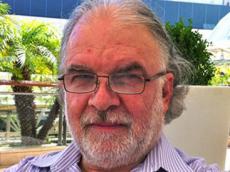Today.Az » Analytics » How Russia can hit NATO’s soft underbelly
02 April 2014 [14:37] - Today.Az
 By Claude Salhani -Trend:
By Claude Salhani -Trend:
In the decades that followed the end of World War II and all throughout the Cold War the North Atlantic Treaty Organization has trained to repulse military aggression from outside its borders, and believing that extending the North Atlantic's frontiers closer to Russia would make the alliance stronger. What NATO failed to realize is that the danger to the Western alliance could come from within, something it is ill equipped to deal with.
NATO's immediate worry is whether Russian troops currently positioned along Ukraine's borders are likely to repeat what they did in Crimea and move forward and carry out a repeat performance of what they did in Eastern Ukraine. That in any case was the topic of concern when NATO foreign ministers met on Tuesday.
While NATO need not be overly concerned of a Russian advance into Ukraine, it does need to look over its shoulder and a potential threat from within, a fact that Russian President Vladimir Putin is using to his advantage.
It is, if you like, Russia's secret weapon and one that Putin knows he can use to put a stop once and for all to the advance of NATO on what Moscow regards as its traditional zone of influence, read here, former Soviet republics and satellite states of the former USSR.
Right now Russia has its sights set on more than just Ukraine. Russia wants to put a stop to Western expansion eastwards, preventing NATO and the European Union from achieving their aspiration of creating a single unified Europe. And the most amazing thing is that Putin can accomplish this without firing a single shot.
"Russia has its eyes on bigger goals than Ukraine -- it wants to tear apart the territorial status quo created in Europe after the fall of the Soviet Union," says Jonathan Eyal of the Royal United Services Institute.
There are numerous reasons why Putin does not need to send his forces into Ukraine. Putin is well aware that while Ukraine counts many Russian supporters, there are equally, if not more supporters of a free Ukraine, and unlike in Crimea where Moscow could count on the support of the ethnic Russian population, in invading Ukraine, Russian troops would have to engage in real battles with Ukrainians who would oppose Russian domination.
Additionally, unlike the Crimean peninsula, Ukraine does not have natural delimitations - natural frontiers - making a military campaign somewhat dangerous as there are no "guard rails," or as Eyal puts it, "there are no obvious limits to this territory." In case the campaign does not unfold as planned, it leaves no obvious exit strategy for Moscow. Also Eastern Ukraine is a much larger territory and would require a substantial military force to effectively control it.
Putin knows that NATO is not about to start a war in Europe over Crimea, with its large Russian population, Moscow has a firm support base there. In fact when U.S. Secretary of State John Kerry met with Russian Foreign Minister Sergei Lavrov in Paris last week, the issue of Crimea was not even mentioned in the final communiqué.
What Russia wants is to maintain Ukraine as a natural buffer zone between it and the Western alliance, giving Russia a clear "kill zone" in case of attack. The large plains of Ukraine would require massive armor and infantry to occupy, and would require some time to advance across the open plains, giving the Russian military ample time to beef up defenses to Russia proper. What Moscow hopes to achieve is to maintain Ukraine as a no-man's land. And this Putin believes, according to Eyal, can be achieved through "what Moscow likes to call the 'federalization' of Ukraine."
As the BBC explains, Russia's intention is to create a federated Ukraine where the regions would have a say in both the country's internal and foreign policy.
An article published on the BBC's website says, "[this], is a more polite Russian way of saying that the ethnic Russians inside Ukraine will be able to block the country's pro-Western orientation."
As a fall back contingency plan, Russia can always push the ethnic Russians in Ukraine to push for separation and independence from Kiev.
This tactic can become a real nightmare for NATO because Moscow can apply similar policies in other parts of Europe where there are important numbers of ethnic Russians, for example in the Trans-Dniester region of Moldova, a former Soviet republic, or in Latvia, Lithuania and Estonia.
In short, NATO was preparing for conventional threats while leaving its "six" uncovered.
Claude Salhani is senior editor at Trend Agency in Baku and a political analyst specializing in the Middle East, Central Asia and terrorism. You can follow him in Twitter @claudesalhani.
|
|